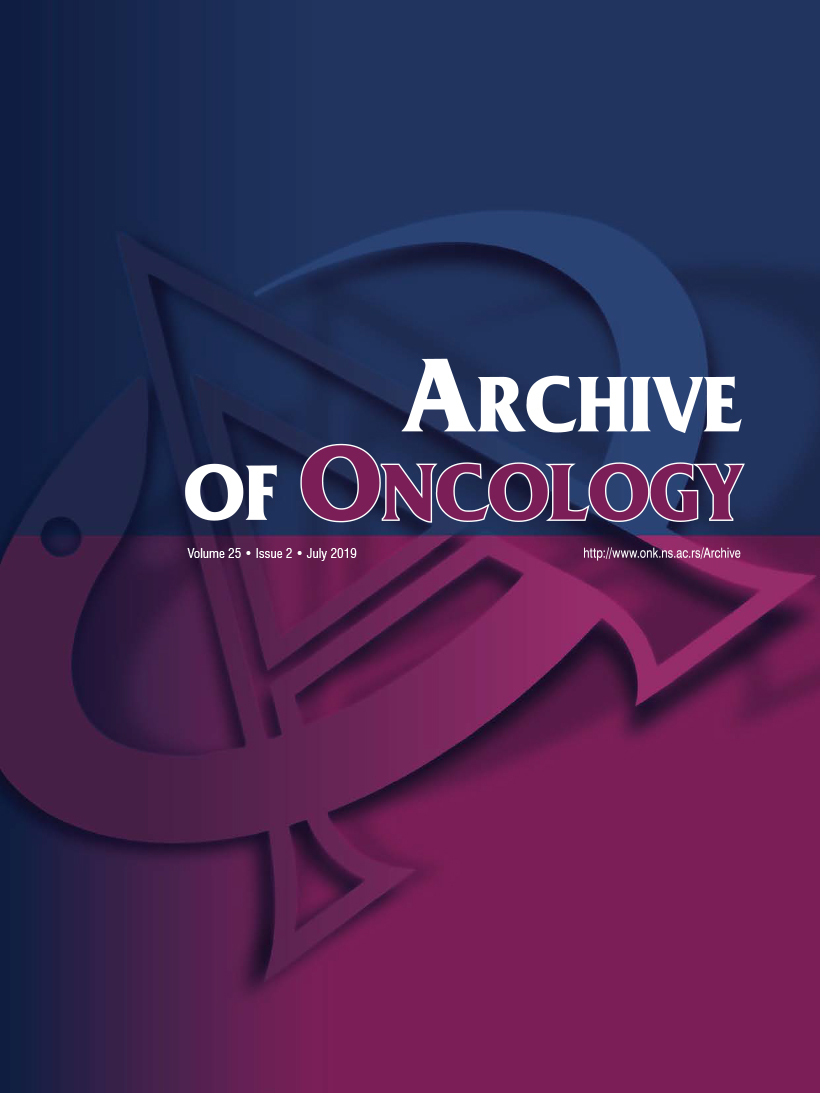Long-term survival of a patient with locally advanced hilar cholangiocarcinoma (Klatskin tumor): a case report and review on high level evidence
Abstract
Cholangiocarcinoma, malignant tumor of epithelial cells of bile ducts has poor overall survival and prognosis. We report a case of non-resectable cholangiocarcinoma with a 57-month survival after incomplete R2 surgical margin resection of the tumor. A 52-year old man with generalized itching, jaundice, brownish urine, mild abdominal pain and weight loss of 8 kg in last two months presented. Imaging and surgical workups showed hilar cholangiocarcinoma (Klatskin tumor). Along with incomplete R2 margin resection we performed stent embedding and post-operative adjuvant chemotherapy. Based on current literature data there is no superiority of adjuvant chemotherapy after complete R0 resection compared to incomplete R2 resection. However, it seems that partial resection along with stent embedding and applied adjuvant chemotherapy in cases of locally advanced non-resectable cholangiocarcinoma may increase survival rate.
References
Parker SL, Tong T, Bolden S, Wingo PA. Cancer statistics, 1997. CA: A cancer journal for clinicians. CA: A Cancer Journal for Clinicians 1997;47(1):5-27. doi: 10.3322/canjclin.47.1.5
Shaib Y, El-Serag H. The Epidemiology of Cholangiocarcinoma. Seminars in Liver Disease 2004;24(02):115-125. doi: 10.1055/s-2004-828889
Tsao JI, Nimura Y, Kamiya J, Hayakawa N, Kondo S, Nagino M, Dugan JM. Management of hilar cholangiocarcinoma: comparison of an American and a Japanese experience. Annals of Surgery 2000;232(2):166-174. doi: 10.1097/00000658-200008000-00003
Nathan H, Pawlik TM, Wolfgang CL, Choti MA, Cameron JL, Schulick RD. Trends in survival after surgery for cholangiocarcinoma: a 30-year population-based SEER database analysis. Journal of Gastrointestinal Surgery 2007;11(11):1488-1497. doi: 10.1007/s11605-007-0282-0
Mavros MN, Economopoulos KP, Alexiou VG, Pawlik TM. Treatment and prognosis for patients with intrahepatic cholangiocarcinoma: systematic review and meta-analysis. JAMA Surgery 2014;149(6):565. doi: 10.1001/jamasurg.2013.5137
Khan SA, Taylor-Robinson SD, Toledano MB, Beck A, Elliott P, Thomas HC. Changing international trends in mortality rates for liver, biliary and pancreatic tumours. Journal of Hepatology 2002;37(6):806-813. doi: 10.1016/s0168-8278(02)00297-0
Olnes MJ, Erlich R. A Review and Update on Cholangiocarcinoma. Oncology 2004;66(3):167-179. doi: 10.1159/000077991
Carriaga MT, Henson DE. Liver, gallbladder, extrahepatic bile ducts, and pancreas. Cancer. 1995;75(S1):171-90.
Khan SA, Thomas HC, Davidson BR, Taylor-Robinson SD. Cholangiocarcinoma. The Lancet 2005;366(9493):1303-1314. doi: 10.1016/s0140-6736(05)67530-7
Tyson GL, El-Serag HB. Risk factors for cholangiocarcinoma. Hepatology 2011;54(1):173-184. doi: 10.1002/hep.24351
Palmer WC, Patel T. Are common factors involved in the pathogenesis of primary liver cancers? A meta-analysis of risk factors for intrahepatic cholangiocarcinoma. Journal of Hepatology 2012;57(1):69-76. doi: 10.1016/j.jhep.2012.02.022
Hirschfield GM, Karlsen TH, Lindor KD, Adams DH. Primary sclerosing cholangitis. The Lancet 2013;382(9904):1587-1599. doi: 10.1016/s0140-6736(13)60096-3
Ren H, Yu T, Liu C, Li Y. Diabetes mellitus and increased risk of biliary tract cancer: systematic review and meta-analysis. Cancer Causes and Control 2011;22(6):837-847. doi: 10.1007/s10552-011-9754-3
Blechacz B, Gores GJ. Cholangiocarcinoma: Advances in pathogenesis, diagnosis, and treatment. Hepatology 2008;48(1):308-321. doi: 10.1002/hep.22310
DeOliveira ML, Cunningham SC, Cameron JL, Kamangar F, Winter JM, Lillemoe KD, Schulick RD. Cholangiocarcinoma: thirty-one-year experience with 564 patients at a single institution. Annals of Surgery 2007;245(5):755-762. doi: 10.1097/01.sla.0000251366.62632.d3
Kahaleh M, Mishra R, Shami VM, Northup PG, Berg CL, Bashlor P, Yeaton P. Unresectable Cholangiocarcinoma: Comparison of Survival in Biliary Stenting Alone Versus Stenting With Photodynamic Therapy. Clinical Gastroenterology and Hepatology 2008;6(3):290-297. doi: 10.1016/j.cgh.2007.12.004
Mihalache F, Tantau M, Diaconu B, Acalovschi M. Survival and quality of life of cholangiocarcinoma patients: a prospective study over a 4 year period. Journal of Gastrointestinal & Liver Diseases. 2010;19(3).
Zhou Y, Liu S, Wu L, Wan T. Survival after surgical resection of distal cholangiocarcinoma: A systematic review and meta-analysis of prognostic factors. Asian Journal of Surgery 2017;40(2):129-138. doi: 10.1016/j.asjsur.2015.07.002
Wellner UF, Shen Y, Keck T, Jin W, Xu Z. The survival outcome and prognostic factors for distal cholangiocarcinoma following surgical resection: a meta-analysis for the 5-year survival. Surgery Today 2017;47(3):271-279. doi: 10.1007/s00595-016-1362-0
Li M, Bi X, Li Z, Huang Z, Han Y, Zhao J, Cai J. Impaction of surgical margin status on the survival outcome after surgical resection of intrahepatic cholangiocarcinoma: a systematic review and meta-analysis. Journal of Surgical Research 2016;203(1):163-173. doi: 10.1016/j.jss.2016.02.012
Tang H, Lu W, Li B, Meng X, Dong J. Influence of surgical margins on overall survival after resection of intrahepatic cholangiocarcinoma: A meta-analysis. Medicine 2016;95(35):4621. doi: 10.1097/md.0000000000004621
Bird NTE, McKenna A, Dodd J, Poston G, Jones R, Malik H. Meta-analysis of prognostic factors for overall survival in patients with resected hilar cholangiocarcinoma. British Journal of Surgery 2018;105(11):1408-1416. doi: 10.1002/bjs.10921
Murakami Y, Uemura K, Sudo T, Hayashidani Y, Hashimoto Y, Nakamura H, Sueda T. Gemcitabine-Based Adjuvant Chemotherapy Improves Survival After Aggressive Surgery for Hilar Cholangiocarcinoma. Journal of Gastrointestinal Surgery 2009;13(8):1470-1479. doi: 10.1007/s11605-009-0900-0
Jarnagin WR, Fong Y, DeMatteo RP, Gonen M, Burke EC, Bodniewicz J, Blumgart LH. Staging, Resectability, and Outcome in 225 Patients With Hilar Cholangiocarcinoma. Annals of Surgery 2001;234(4):507-519. doi: 10.1097/00000658-200110000-00010
Kang MJ, Jang J, Chang J, Shin YC, Lee D, Kim HB, Kim S. Actual Long-Term Survival Outcome of 403 Consecutive Patients with Hilar Cholangiocarcinoma. World Journal of Surgery 2016;40(10):2451-2459. doi: 10.1007/s00268-016-3551-9

